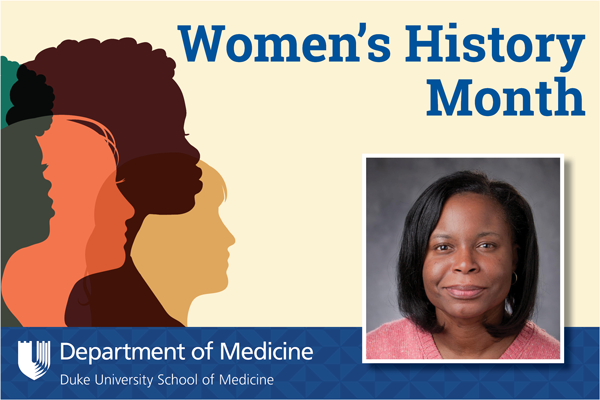
The only thing about Kimberly Johnson, MD, MHS, that may be stronger than her trailblazing research record on health equity is her passion and dedication for promoting rigorous scientific studies to understand why inequity occurs in health care settings, and how best to address it.
Recently named the Brenda E. Armstrong, MD, Distinguished Professor, Dr. Johnson is a professor in the division of Geriatrics and Palliative Care, and director of the Duke Center for Research to Advance Health Equity (REACH Equity) who has led the way nationally in investigating how cultural beliefs, preferences and organizational practices and policies influence the use of hospice care by older African Americans.
Her overall research agenda focuses on reducing disparities in access, quality, and use of palliative care for older African Americans with serious illness.
“African Americans face disparities in access to and quality of care that extend from birth to the end-of-life, including lower quality pain management, provider communication, and use of services that improve care such as hospice,” said Dr. Johnson, who early in her career became interested in improving the experience of seriously ill, older African Americans at a time when few people were working in the space. “Even now, African Americans are often not well represented in palliative care studies and there is a dearth of research focused on reducing disparities. What excites me most is to see an increasing number of young investigators interested in research to improve equity in serious illness care.”
Creating Communities of Equity
Beginning in 2017, Johnson started on a journey to create a community of investigators with a focus on advancing equity at Duke.
Since establishing REACH Equity—funded by the National Institute of Minority Health and Health Disparities (NIMHD) —in 2017, she has worked tirelessly to create a collaborative environment among a team of talented investigators–all working to develop and test interventions that have a significant impact on reducing disparities in clinical care. The Center’s theme recognizes that providers and health systems are important contributors to health disparities although most studies of interventions to reduce disparities have focused on changing patient behavior and knowledge, leaving substantial gaps in the evidence base of effective interventions to reduce disparities in health care delivery.
Under her leadership, 63 investigators, Including, 19 summer undergraduate researchers, five medical students have completed third-year projects, eight fellows and post doc trainees funded through the REACH Equity Scholars award along with 19 junior investigators (18 via career development awards and one diversity supplement) and 12 investigators via faculty vouchers and think tanks.
Consistent with the center’s goal to diversify the research workforce, over half of its investigators have come from groups underrepresented in science and medicine, and the center has continued to expand the community of health disparities investigators at Duke via its Research Works in Progress Sessions with over 2,000 attendees, 72 speakers and 30 disciplines represented.
A Home for Health Disparities Research
REACH Equity has supported strong research to address disparities in health care delivery, including studies focused on developing interventions to address provider implicit bias, improve communication in cardiology encounters, reduce unmet needs in the ICU, improve adherence to medications for patients with Lupus, reduce pre-term birth in Black women, and improve asthma management for Black patients.
“However, what I think has been most special about REACH Equity is its role in building a community and creating a home for health disparities investigators across the campus who share a common cause and commitment to improving health and health care equity,” said Dr. Johnson, who also co-directs the Duke Clinical and Translational Science Institute (CRSI) KL2 Program, which provides training and research opportunities for junior investigators, and the Research Education Core of the Duke Pepper Center. She has become an important mentor to many.
“It has been an honor to be apart of a growing community and movement across our campus to center research and practice on issues related to health equity. However, there is still so much work to do to address inequities,” she said. “I am looking forward to working with colleagues to expand our work and increase its impact in improving health and healthcare for patients in our health system and beyond.”